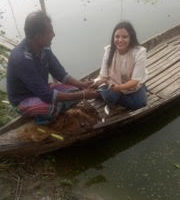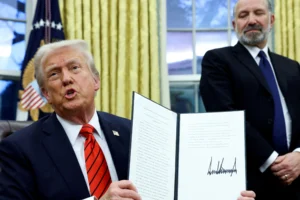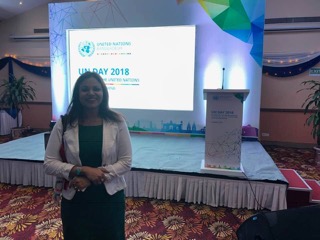China has taken aim at major American businesses as it looks for ways to retaliate against President Donald Trump’s mounting tariffs. It has targeted cars, beef and soybeans — and, apparently, Bob Woodward’s latest tale of Washington dysfunction and intrigue.
“Fear: Trump in the White House,” which Woodward wrote in 2018, is one of hundreds of American books held up by Chinese publishing regulators since the trade war intensified this year. Publishers inside and outside China say the release of American books has come to a virtual standstill, cutting them off from a big market of voracious readers.
“American writers and scholars are very important in every sector,” said Sophie Lin, an editor at a private publishing company in Beijing. “It has had a tremendous impact on us and on the industry.” After new titles failed to gain approval, she said, her company stopped editing and translating about a dozen pending books to cut costs.
The Chinese book world is cautiously optimistic that the partial trade truce reached this month between Beijing and Washington will break the logjam, according to book editors and others in the publishing industry who spoke to The New York Times. Already, they said, some have won approvals after China celebrated its National Day on Oct 1, a politically perilous event that had Chinese officials on edge.
But they also worry that American books could be targeted in future crackdowns. Under Xi Jinping, China’s top leader, the Communist Party has worked to reduce the influence of foreign media to make room for Chinese books, movies and television shows. Even before the trade war intensified, some say, Chinese regulators were taking a tougher stance on foreign books.
People in the publishing industry are reluctant to discuss publicly which books have been held up for fear that Beijing will target them for speaking out. Many spoke on condition of anonymity. But a review of lists of books that had been set to be published this year shows a wide variety of bestsellers and academic titles alike that have failed to appear as promised.
Besides Woodward’s book, they include a translation of the 1973 novel “Child of God,” by Cormac McCarthy; “Asymmetry,” the first novel by Lisa Halliday; “Marriage: A History,” Stephanie Coontz’s nonfiction look at humanity’s most intimate partnership; “China and Japan,” about the turbulent history between the Asian giants by influential Sinologist Ezra Vogel; and a new Chinese version of “Public Philosophy: Essays on Morality in Politics,” by Harvard professor Michael Sandel, whose online courses have been a hit with many young people in China.
The reasons for the delayed publication of each title are not clear. For example, some people in the publishing industry wondered whether the political content of Woodward’s book, rather than the trade war, stymied its release. The Communist Party’s Central Publicity Department, which manages the book approval process, did not respond to faxed questions.
Still, publishing industry insiders describe a near freeze of regulatory approvals, one that could make the publishing industry reluctant to buy the rights to sell American books in China.
“Chinese publishers will definitely change their focus,” said Andy Liu, an editor at a Beijing publishing company, adding that the United States was one of China’s most frequent and profitable sources of books.
“Publishing American books is now a risky business,” he said. “It’s shaking the very premise of trying to introduce foreign books” as a business.
While China is known for its censorship, it is also a huge market for books, including international ones. It has become the world’s second-largest publishing market after the United States, according to the International Publishers Association, as an increasingly educated and affluent country looks for something engrossing to curl up with.
Even some foreign books that one might think would run afoul of Communist Party censors can be found in real and virtual bookstores. George Orwell’s “1984,” a fictional condemnation of totalitarianism, is widely read because it is considered a classic of world literature. A number of books by Ayn Rand, the patron saint of far-right capitalism, have been translated into Chinese.
American books in particular are widely read. In 2017, Chinese buyers obtained copyrights for more than 6,000 American books, accounting for more than one-third of all foreign books claimed, according to data from the National Copyright Administration. “The Kite Runner,” the novel by Khaled Hosseini about turmoil in Afghanistan, was a fixture on China’s best-seller lists, as was Walter Isaacson’s biography of Apple co-founder Steve Jobs.
But the environment has grown more cautious in recent years, book editors and industry executives said. The Communist Party’s publicity department told publishers this year that the total number of books getting approvals would shrink, that domestic authors would be favoured and that titles that promoted the party and China’s capitalism-infused version of socialism would be most encouraged.
Some editors described efforts to get around the rules, like asking Chinese American authors to switch nationalities on paper. Some authors agreed, but others refused, insisting that their books were “very American” or obviously sponsored by American institutions, said an editor from an academic publishing house.
Authors from other countries have been affected by the ins and outs of Chinese diplomacy. Permissions for Japanese books have become easier this year, the industry people said, as Beijing sought smoother relations with Tokyo.
Book publishing in China has long been a contentious process. To gain government approval, Chinese publishers often cut or change sexual or political content.
Last month, Edward Snowden, the former National Security Agency contractor who detailed the vast abilities of the US government’s surveillance systems, posted on Twitter that the Chinese version of his autobiography had been scrubbed of mentions of Chinese censorship, the Arab Spring protests and other material.
In 2015, 12 publishers in the United States signed a pledge organized by PEN American Centre, a writers group, to try to minimize censorship of books in China and to make sure authors were fully aware of the changes.
Publishers in China now wonder whether they have entered an even tougher era.
Lisa Han, a literature and social science editor at a Beijing publisher, said a politically harmless memoir she had been working on was finally approved in November. A process that would normally take two weeks had taken three months.
Han said her company had begun stockpiling permissions to print American books when it became clear last year that the trade war could worsen tensions across many industries. Those initial applications came through without trouble, she said.
“Seventy to 80 percent of books in our department are American,” Han said. “I haven’t really thought about the future. If it really gets too tough, I’ll just quit.”
More broadly, some people in the book world see a slowdown in American books released in China as a troubling freeze in the exchange of ideas on both sides. Although the two countries remain tightly woven economically, leaders in both are openly talking about a day when the two become less dependent on each other — and, perhaps, more contentious rivals.
“Given the vast gulf in understanding and communication between the US and China, we should be worried about any narrowing of the flow of information,” Suzanne Nossel, executive director of what is now PEN America, wrote in an email.






















